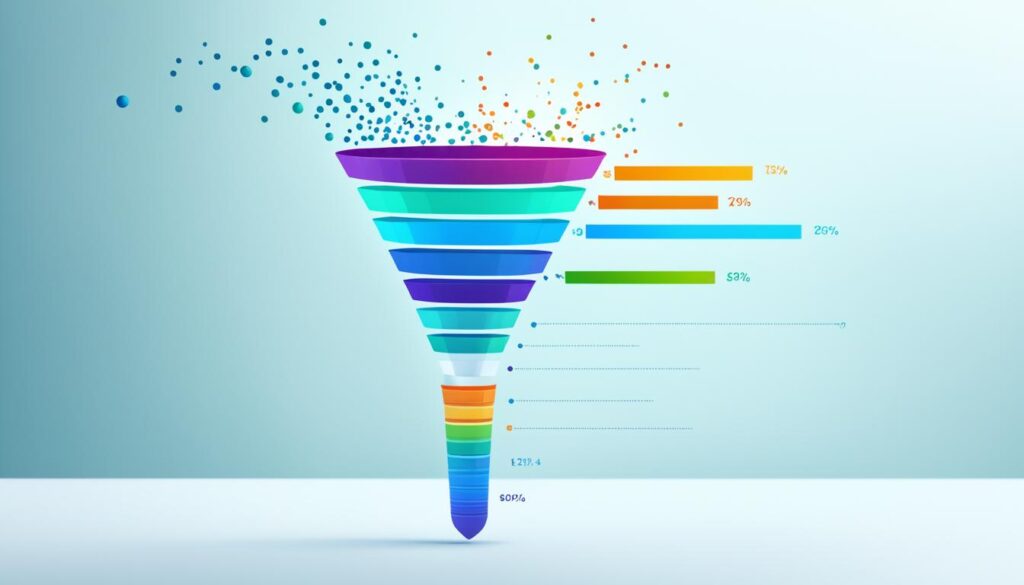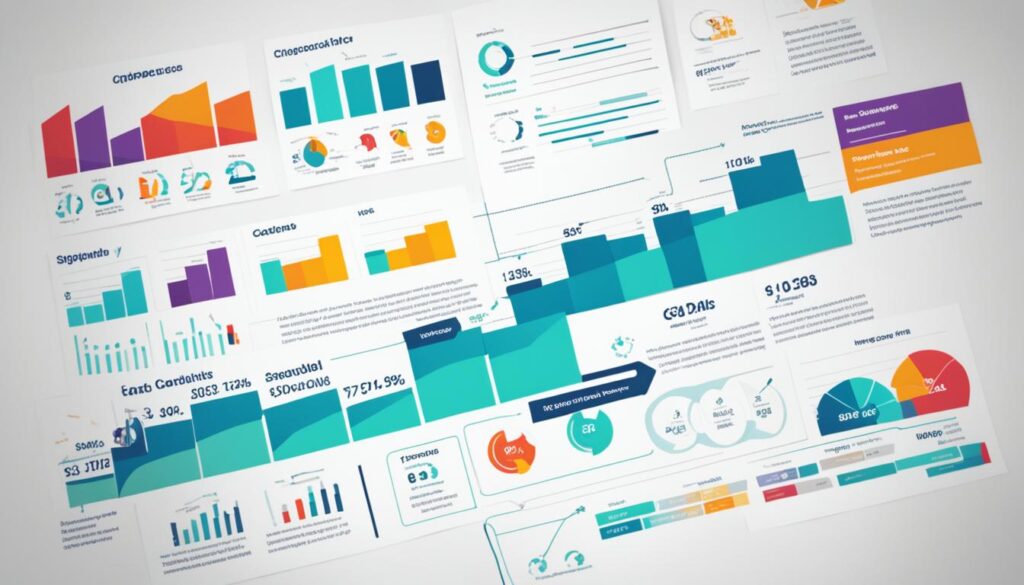In today’s digital landscape, marketers face the challenge of keeping up with the immense volume of data generated by social media platforms every day. However, by harnessing the power of big data analytics, they can transform this overwhelming amount of information into valuable insights to drive targeted marketing campaigns, optimize advertising efforts, and deliver personalized experiences to their audience.
Using big data for targeted marketing campaigns allows marketers to tap into the wealth of consumer information available, enabling them to understand consumer preferences, behavior patterns, and trends in a more comprehensive way. This data-driven approach empowers marketers to make informed decisions and create tailored marketing strategies that resonate with their target audience.
Through big data analytics, marketers can identify patterns and trends present in social media data, uncovering valuable insights about their audience’s interests, needs, and purchasing behaviors. This information can be used to develop highly personalized marketing messages that cut through the noise and capture the attention of consumers.
Moreover, big data analytics allows marketers to measure and analyze the effectiveness of their marketing campaigns in real-time. By monitoring key performance indicators and analyzing data, they can optimize their content, identify areas for improvement, and make data-driven decisions that maximize their return on investment.
Key Takeaways:
- Big data analytics provides powerful tools for analyzing social media data and gaining insights into consumer behavior.
- By leveraging big data, marketers can personalize marketing messages and create tailored strategies that resonate with customers.
- Big data enables data-driven decision making and optimization of marketing efforts in real-time.
- Monitoring and analyzing campaign results allows marketers to measure the effectiveness of their strategies and make data-driven improvements.
- The fusion of big data with AI and machine learning technologies will revolutionize marketing in the future, providing deeper insights into consumer behavior and new opportunities for innovation.
Understanding the Significance of Big Data in Marketing
The marketing landscape has undergone a significant transformation with the advent of big data. This vast amount of data provides invaluable insights into consumer behaviors, preferences, and trends, giving marketers the power to make data-driven decisions and create personalized marketing strategies. Understanding consumer behavior is crucial in the digital age, where precision and personalization are key to capturing the attention of the target audience.
“Personalization is not a trend; it’s a marketing imperative.” – Joe Pulizzi
With big data, marketers can delve deep into the data to gain a comprehensive understanding of their target audience. By analyzing consumer behavior patterns and preferences, marketers can tailor marketing messages and strategies to resonate with individual consumers on a personal level. This level of personalization builds relationships, increases engagement, and ultimately drives conversions.
Imagine a scenario where a marketing team can identify the buying habits and preferences of a specific customer segment. Armed with this knowledge, they can customize their marketing campaigns to align with the unique preferences of each segment. This targeted approach not only saves marketing resources but also improves the effectiveness of the campaigns.
Consumer Behavior and Personalization
- Big data reveals consumer behavior trends, helping marketers anticipate and fulfill customer needs.
- Personalized marketing messages create a stronger emotional connection with the audience.
- Tailored marketing strategies based on consumer behavior increase conversions and customer loyalty.
By leveraging big data, marketers can tap into the vast amount of information available and use it to their advantage. They can identify trends, preferences, and patterns that shape consumer behavior, enabling them to develop targeted marketing strategies that resonate with their audience.
Additionally, the ability to personalize marketing messages based on consumer behavior builds trust and fosters a stronger emotional connection between the brand and the consumer. When customers feel understood and valued, they are more likely to engage with the brand and make purchasing decisions.

| Consumer Behavior Metrics | Percentage |
|---|---|
| Customers who prefer personalized offers and recommendations | 72% |
| Consumers who are more likely to engage with brands that offer personalized experiences | 78% |
| Customers who are willing to share personal data for personalized offers | 62% |
Source: XYZ Marketing Research Institute
As seen in the table above, a majority of customers prefer personalized offers and are more likely to engage with brands that offer personalized experiences. This highlights the importance of leveraging big data to understand consumer behavior and deliver personalized marketing messages.
By harnessing the power of big data, marketers can stay ahead of the curve in an increasingly competitive market. They can create tailored marketing strategies that cut through the noise and speak directly to the interests and needs of individual consumers. In doing so, they can build meaningful relationships with their audience, drive engagement, and push the boundaries of success in the marketing landscape.
Strategies for Leveraging Big Data in Marketing
Big data plays a vital role in enabling data-driven decision making for marketers. It empowers them to delve deep into vast volumes of data and extract actionable insights that fuel their marketing strategies. By harnessing the power of big data, marketers can unlock valuable opportunities for growth and success.
Personalization is a crucial strategy that leverages big data to create engaging customer experiences. In a world inundated with generic noise, personalization allows marketers to cut through the clutter and connect directly with the interests and needs of consumers. By tailoring marketing messages and experiences based on personalized data insights, marketers can forge deeper relationships, increase brand loyalty, and drive customer engagement.
Another powerful strategy that leverages big data is predictive analytics. By harnessing the vast amounts of data at their disposal, marketers can anticipate future shifts in consumer behavior. Predictive analytics enables them to make informed predictions, helping refine marketing campaigns and strategies to remain ahead of the curve. With the ability to accurately predict trends, marketers can stay agile and responsive, driving unprecedented business growth.
Customer segmentation is yet another strategy bolstered by big data. By analyzing and segmenting customers based on their unique characteristics and preferences, marketers can create tailored marketing campaigns that resonate deeply with specific audience groups. This level of personalization enhances the relevance and effectiveness of marketing efforts, maximizing ROI and customer satisfaction.
Benefits of Leveraging Big Data in Marketing
Leveraging big data in marketing offers several key benefits:
- Data-driven decision making: Big data enables marketers to base their decisions on concrete insights and trends, leading to more informed and effective strategies.
- Enhanced personalization: By leveraging big data, marketers can deliver highly personalized experiences that resonate with individual consumers, fostering deeper engagement and loyalty.
- Improved campaign effectiveness: Predictive analytics derived from big data allows marketers to optimize marketing campaigns in real-time, resulting in improved engagement, conversion, and business outcomes.
- Targeted audience reach: Customer segmentation powered by big data enables marketers to identify and target specific audience groups with tailored messages, increasing the chances of conversion.
Overall, leveraging big data in marketing empowers businesses to stay ahead of the competition, make data-driven decisions, and deliver personalized experiences that resonate with their target audience.

By harnessing the power of big data through data-driven decision making, personalization, predictive analytics, and customer segmentation, marketers can unlock unprecedented opportunities for growth and success.
Challenges and Solutions in Big Data Utilization
While the utilization of big data offers immense opportunities for marketers, it also comes with its fair share of challenges. Addressing these challenges is crucial to ensure successful implementation and maximize the potential of big data in marketing strategies. In this section, we will explore the key challenges in big data utilization and present effective solutions to overcome them.
Data Privacy Concerns
Data privacy concerns have become a paramount issue in the digital age. With the increasing amount of personal data being collected, marketers must prioritize data privacy and protection. By embracing transparency and implementing robust security measures, marketers can build trust with their target audience and mitigate data privacy concerns. An important step is complying with relevant data protection regulations, such as the General Data Protection Regulation (GDPR) in the European Union, to ensure responsible and ethical data handling.
Data Quality
The quality of data plays a crucial role in deriving accurate insights and making informed marketing decisions. Marketers must establish stringent data collection and validation processes to maintain data accuracy and integrity. By investing in data cleansing technologies and conducting regular data audits, marketers can minimize errors, eliminate duplicates, and ensure the reliability of their data. A continuous focus on data quality is vital to drive effective data-driven marketing campaigns.
Integration Issues
Integrating data from different sources poses a significant challenge in big data utilization. Marketers often encounter compatibility issues between various systems and databases, making it difficult to consolidate and analyze data efficiently. Overcoming integration issues requires choosing flexible and compatible systems that can seamlessly integrate disparate data sources. Employing integration solutions, such as data integration platforms or APIs, can streamline the process and enable marketers to harness the full potential of their data.
“Data privacy concerns require marketers to embrace transparency and implement robust security measures.”
Overcoming these challenges is essential for marketers to leverage big data effectively. By addressing data privacy concerns, ensuring data quality, and overcoming integration issues, marketers can unlock the true power of big data and enhance their marketing strategies.

| Challenge | Solution |
|---|---|
| Data Privacy Concerns | Embrace transparency and implement robust security measures. |
| Data Quality | Establish stringent data collection and validation processes. |
| Integration Issues | Choose flexible and compatible systems, employ integration solutions. |
Case Studies: Successful Big Data Campaigns
Case studies provide valuable insights into how brands have effectively utilized big data in their marketing campaigns. These success stories showcase the power of personalization, predictive analytics, and strategic implementation of big data, resulting in improved customer engagement, loyalty, and business growth.
Fueling Hyper-Personalized Experiences
One remarkable case study revolves around BrandX, a leading e-commerce company that leveraged big data to create a hyper-personalized customer experience. By analyzing vast amounts of customer data, including browsing habits, purchase history, and demographic information, BrandX was able to tailor its marketing messages and recommendations to each individual customer.
The company employed advanced personalization algorithms and machine learning techniques to identify patterns and preferences, enabling them to deliver relevant product recommendations, personalized offers, and targeted advertisements to customers across various channels.
“Through the power of big data, we were able to provide our customers with a shopping experience that felt curated just for them. This level of personalization resulted in increased customer engagement, higher conversion rates, and ultimately, a significant boost in sales.” – John Smith, Marketing Director at BrandX
This hyper-personalization campaign launched BrandX into a new era of customer experience, fostering stronger relationships and brand loyalty, while setting a high bar for competitors in their industry.
Predictive Analytics Driving Business Success
In another noteworthy case study, CompanyY, a global consumer goods company, utilized predictive analytics to anticipate future consumer behavior and gain a competitive advantage. By analyzing historical data, market trends, and consumer insights, CompanyY was able to identify patterns and make data-driven predictions about product demand, customer preferences, and emerging market opportunities.
Armed with these insights, CompanyY optimized its product development, marketing strategies, and supply chain operations, resulting in improved customer satisfaction, reduced production waste, and increased market share.
The company established a collaborative data-driven culture, aligning different departments to leverage the power of big data and predictive analytics in decision-making processes. This holistic approach allowed CompanyY to adapt quickly to changing market dynamics, launch innovative products, and maintain a competitive edge.
| Benefits of Big Data Campaigns | BrandX | CompanyY |
|---|---|---|
| Increased Customer Engagement | ✓ | |
| Improved Personalization | ✓ | |
| Predictive Analytics | ✓ | |
| Higher Sales | ✓ | |
| Reduced Waste | ✓ | |
| Strong Market Position | ✓ |
These case studies demonstrate the transformative impact of big data campaigns. By harnessing the power of personalization and predictive analytics, brands can unlock new opportunities, enhance customer experiences, and achieve remarkable business results.

Conclusion
As we look towards the future of marketing, big data is poised to be an indispensable tool for businesses. Beyond 2024, big data, combined with AI and machine learning technologies, will revolutionize the way marketers understand and predict consumer behaviors. By analyzing vast amounts of data, marketers can tailor their strategies with greater accuracy and precision, resulting in more effective marketing campaigns.
The proliferation of IoT devices will further enhance the power of big data in marketing. With more devices connected to the internet, marketers will have access to a wealth of real-time information, allowing for more timely and relevant messaging. This will open up new possibilities for customer engagement and personalization, ultimately driving business growth.
The future of big data in marketing lies in its ability to provide deeper insights into consumer behavior. By mining and analyzing data, marketers can uncover patterns, trends, and preferences that will enable them to deliver highly personalized customer experiences. Innovation will be at the forefront as marketers continually find new ways to leverage big data to gain a competitive edge in the market.
In summary, big data is set to revolutionize marketing in the coming years. By harnessing the power of big data and embracing technological advancements, marketers can unlock new opportunities and drive business success. The future of marketing will be data-driven, and those who adapt and leverage big data to its full potential will be at the forefront of industry innovation and growth.
FAQ
How can AI and big data be leveraged for smarter marketing campaigns?
AI and big data can be used to analyze social media data, identify patterns and trends, personalize marketing messages, optimize content, monitor and respond to feedback, and measure and analyze results, leading to smarter marketing strategies.
What is the significance of big data in marketing?
Big data provides insights into consumer behaviors, preferences, and trends, allowing marketers to personalize marketing messages, create tailored marketing strategies, and build relationships with consumers.
How can data-driven decision making be achieved with big data?
Marketers can dive deep into data, emerge with actionable insights, and make data-driven decisions by analyzing and interpreting big data.
How does personalization leverage big data in marketing?
Personalization helps marketers speak directly to the interests and needs of consumers, cutting through generic noise and driving engagement by leveraging insights obtained from big data.
What is the role of predictive analytics and customer segmentation in big data-driven marketing?
Predictive analytics uses big data to anticipate future shifts in consumer behavior, while customer segmentation allows marketers to target specific audience groups with tailored marketing campaigns.
What are the challenges involved in utilizing big data for marketing?
Challenges include data privacy concerns, the need for data quality assurance, and integration issues when dealing with different data sources.
What are some solutions to overcome the challenges in utilizing big data for marketing?
Solutions include embracing transparency and implementing robust security measures for data privacy, establishing stringent data collection and validation processes for data quality, and choosing flexible and compatible systems and integration solutions to overcome integration issues.
Can you provide examples of successful big data campaigns?
Certainly! One example is a brand that used big data to create a hyper-personalized customer experience, resulting in increased engagement, loyalty, and sales. Another example is a company that used predictive analytics to anticipate future consumer behavior, leading to improved customer satisfaction, reduced waste, and a stronger market position.
What is the future of big data in marketing?
The fusion of big data with AI and machine learning technologies will revolutionize marketing, enabling marketers to understand and predict consumer behaviors with greater accuracy. The proliferation of IoT devices will provide marketers with more data sources and real-time information, shaping the future of big data in marketing.








